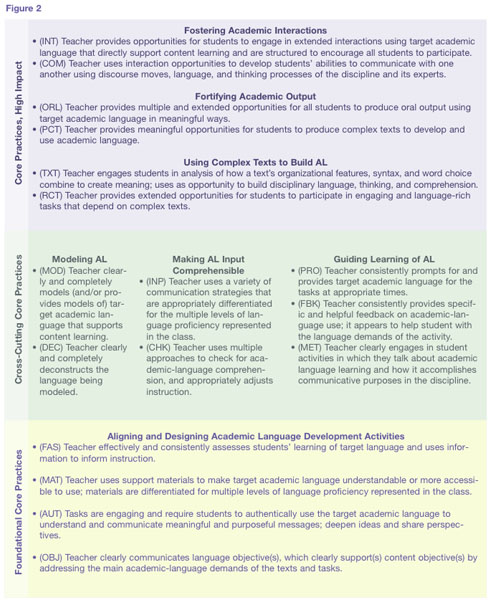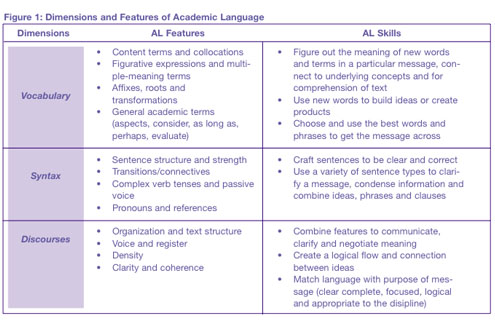
Susan O’Hara, Jeff Zwiers, and Robert Pritchard explain the mission of the Academic Language Development Network
The Academic Language Development Network (http://aldnetwork.org) is a collaborative project, co-housed at the University of California Davis and Stanford University. The Network focuses on research-based teaching and assessment practices for developing the complex academic language, literacy, and thinking skills that support the learning of the Common Core State Standards, Next Generation Science Standards, and new ELD standards. One of the main purposes of this network is to share ongoing research and effective professional development resources for building system-wide capacity to meet the instructional needs of academic English learners. We currently collaborate on professional development and research efforts in multiple school districts, counties, and states.
The work of the ALD Network will be featured at the seventh annual Academic Literacy Summit co-hosted by the CRESS center (http://education.ucdavis.edu/cress-center) located within the School of Education at UC Davis. This year’s summit, Keys to Unlock the Common Core: Academic Literacy for All, focuses on how teachers and schools can imaginatively adapt to the new California Common Core Standards in literacy across all subjects (http://education.ucdavis.edu/2014-summit). Jeff Zwiers, co-director of the ALD Network and senior researcher at Stanford University will deliver the keynote address, and teacher leaders who have been involved with the ALD Network will share practices from their classrooms. Teachers, coaches, and educators will, in 90 minutes, present workshops and share effective academic-literacy instructional and coaching practices aligned with Common Core State Standards. Below is an overview of the research and development work conducted by the ALD Network.
Introduction
The development of academic language and literacy is one of the most important factors in the academic success of English learners and has been increasingly cited as a major contributor to gaps in achievement between ELs and English-proficient students (Anstrom et al., 2010; Francis, Rivera, Lesaux, Kieffer, & Rivera, 2006). Some argue that “achievement gap,” usually indicated by yearly test scores and/or graduation rates, is largely an academic language gap.
The Common Core State Standards (CCSSs) have added an exciting and challenging layer to the schooling of ELs. The exciting part is that many of the CCSSs focus on robust development of disciplinary thinking and communication skills, which better prepare all students for success in college. The challenging part is that meeting these new standards requires higher levels of receptive and productive academic language. The CCSS, for example, place a high emphasis on argument-based reasoning, writing and reading complex texts, and engaging in academic discourse across disciplines. Such skills demand much more advanced abilities to use academic syntax and communication skills than learning that is based on memorization. This situation is further complicated by a wide variety of English learner differences and needs, such as language and literacy levels in English, that are not addressed in depth in the CCSS.
Explicit attention to academic language instruction, coupled with extended opportunities for students to hear and use academic language, is needed in classrooms with English learners and other students who struggle to understand and use the language of school (Anstrom et al., 2010). Yet this is seldom the kind of instruction we see in classrooms with large numbers of ELs. One reason for this is the lack of clarity about evidence-based classroom practices. A second reason is the lack of support for teachers’ growth in classroom instruction. Identifying classroom practices associated with academic-language-proficiency growth and then targeting these practices in professional development provides a potentially powerful approach for improving the quality of instruction for the nation’s ELs.
The ALDN team has engaged in systematic research to identify essential practices that teachers can use to develop academic language that supports content learning across disciplines. The emerging data show that a small number of instructional practices can have a significant positive effect on students’ development of academic language. However, the data are also showing that we cannot simply create a list of practices to check off when we observe or enact them.
In our reviews of the literature and classroom observation analyses, we synthesized the varying descriptions of academic language into three dimensions, each containing several features and skills. The dimensions are vocabulary, syntax, and discourse. See Figure 1 for a visual representation of the dimensions and their features and skills. The iceberg shows how the depth and complexity increase as one moves from looking at words to looking at how messages are put together for particular audiences.
A Delphi Panel Study of Expert Consensus(1)
In an attempt to move beyond the current research, which articulates broad sets of effective practices for academic-language-development, and in order to identify the most-essential and highest-leverage practices, we conducted an empirical study using a Delphi technique to answer the question: Which instructional practices are most essential and highest leverage for promoting the academic-language development of academic-English learners across disciplines? The methodology for this study was based in part on a Delphi study by Osborne et al. (2003), and was conducted in several steps. The final results of this Delphi panel suggest that there are three essential and high-leverage practices for the development of academic language of adolescent English learners in content-area classrooms: fostering Academic interactions, fortifying academic output, and using complex text to develop academic language.
• Fostering Academic Interactions focuses on structuring and strengthening student-to-student interaction that uses academic language. Interaction consists of students responding to one another, building and challenging ideas, and negotiating meaning. The teacher provides and scaffolds multiple opportunities for students to interact with original, academic messages that require academic language (Cazden, 2001; Lemke, 1990; Long, 1981; Mercer & Littleton, 2007).
• Fortifying Academic Output focuses on structuring, strengthening, and supporting the quantity and quality of students’ production of original, extended academic messages that require academic language (Cazden, 2001; Chafe, 1982; Mercer, 2000; Swain, 1985). The teacher provides and scaffolds multiple opportunities for students to communicate ideas in activities such as oral presentations and answering teacher questions. Output also includes producing complex texts such as essays, articles, web pages, and multimedia presentations. The teacher provides opportunities and supports students in using academic language (vocabulary, syntax, discourse) to produce texts that communicate clear, meaningful, and original academic messages (Harklau, 2002).
• Using Complex Texts focuses on utilizing texts to foster academic language and on developing students’ overall abilities to practice with and process the language of complex texts (August, Artzi, & Mazrum, 2010; Wong, Fillmore & Fillmore, 2011). The teacher engages students in analysis of how a text’s organization, syntax, and word choice combine to create meaning, and fosters analytical discussions of authors’ use of language to convey certain meanings for given purposes. This practice develops students’ overall academic language and metacognitive skills, while also strengthening their disciplinary thinking skills, comprehension habits, and content knowledge of specific texts (Urquhart & Weir, 1998).
Additional findings from this Delphi panel study suggest that these essential, high-leverage practices are central to effective academic-language instruction, but alone they do not get to the core of academic-language teaching. Effective academic-language teachers enact a set of dynamic instructional moves in support of these essential, high-leverage practices. In addition, these teachers negotiate these dynamic moves during instruction in the action of academic-language teaching (O’Hara et al., 2013). The analysis of the Delphi panel data suggests the foundational knowledge teachers need for effective academic-language instruction. It also suggests two categories of dynamic instructional moves that are key to enacting essential, high-leverage practices: (a) the art of scaffolding and guiding academic-language development; and (b) negotiating a balance between explicit and immersive academic-language instruction.
Upon further analysis of the Delphi study results coupled with additional observations of lessons, we realized that a list of practices with varying levels alone would not be enough to describe the model for effective, complex academic-language teaching. Therefore, we generated three initial combinations of practices, and instructional moves, that we call essential practice frames.
Figure 2 shows an example of an essential practice frame.

Next Steps
For the observation tool, we have established inter-rater reliability and content validity. We are partnering with researchers at UC Davis, Stanford, and World-Class Instructional Design & Assessment (WIDA) at the University of Wisconsin in the design of a large-scale study to establish predictive validity of the Academic Language Development Network practices and tools.
Operationalizing the ALD Network Practices
We intend for this set of practices and tools to be used several ways.
First, we believe that they will support teachers in improving their teaching of complex academic language and implementation of the new standards. As we clarify the practices and tools that are most predictive of academic-language development, our team is developing a corresponding set of trainings, videos, tools, and materials to support and illustrate these practices.
Notes
(1) Part of the academic-language work originated with CRESS Center executive director Susan O’Hara (principal investigator) and Jeff Zwiers (senior researcher) when they worked in Stanford’s Center to Support Excellence in Teaching.
Susan O’Hara, UC Davis, Jeff Zwiers, Stanford University, Robert Pritchard, Sacramento State University.



